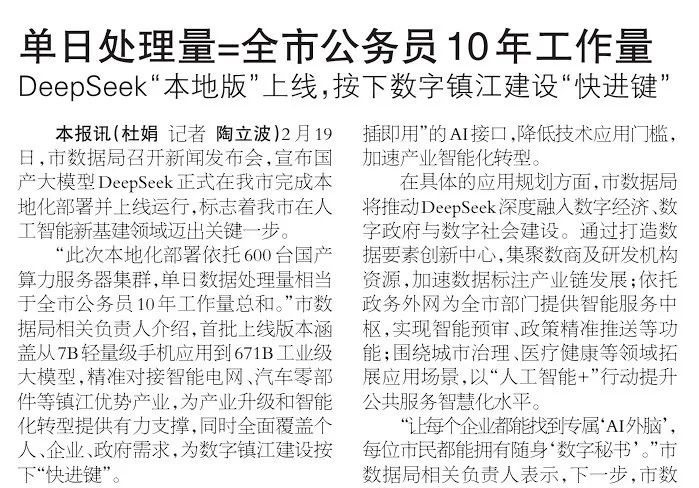The daily data processing volume is equivalent to the total work of civil servants in the city over 10 years.
Author: Mufeng

Image source: Generated by Wujie AI
Recently, the Zhenjiang Data Bureau held a press conference where a relevant official stated that after the localized deployment of DeepSeek, "the daily data processing volume is equivalent to the total work of civil servants in the city over 10 years."

Although the description is not very rigorous, this information quickly went viral, sparking interest in the topic of "AI Governance."
"AI civil servants" are gradually being deployed across the country.
Just a few days before the Zhenjiang press conference, Shenzhen's Futian District launched AI employees developed based on DeepSeek, with the first batch of 70 employees starting work.
According to reports, these AI employees are distributed across 35 government units in the district, covering 240 government work scenarios such as document processing, public service, emergency management, and investment promotion.
In terms of office efficiency, the personalized customization generation time has been compressed from 5 days to minutes, the accuracy rate of document format correction exceeds 95%, review time has been shortened by 90%, and the error rate is within 5%.
Gao Zeng, a member of the Party Leadership Group and Deputy Director of the Futian District Bureau of Government Services and Data Management, introduced that AI digital employees are assistants to civil servants and cannot make independent decisions, "they are not AI civil servants."
In conjunction with this, Futian District also introduced the "Management Measures for Government Auxiliary Intelligent Robots," which delineates the institutional boundaries for AI's role in government affairs, namely three major principles:
First, an ethical framework, where AI is defined as an "auxiliary role," and each digital employee must be equipped with a human guardian, with clear responsibility attribution;
Second, a safety threshold, retaining a human intervention mechanism at key decision nodes;
Third, scene limitations, clearly defining the applicable fields for AI to avoid controversies arising from technological overreach.
In addition to Futian District, Shenzhen's Bao'an District has also integrated DeepSeek + Tencent's mixed Yuan model into its government system to enhance administrative efficiency with AI.
The larger context is Shenzhen's unprecedented emphasis on AI.
On February 13, Shenzhen conducted city-wide AI operation training; on February 16, it officially provided DeepSeek model application services to various districts and departments based on the government cloud environment.
In terms of the concept of AI large models, Hangzhou has recently been trending daily, while Shenzhen seems to be setting a benchmark in AI application scenarios?
Moreover, besides Shenzhen, "AI + civil servants" has already been implemented in government systems in multiple locations.
For example, Guangzhou has launched the DeepSeek-R1 and V3 671B large models, applied in areas such as public policy interpretation systems and 12345 hotline ticket distribution.
For instance, the Dadukou District of Chongqing has introduced a "Digital Grid Worker" system that quickly responds to common issues by collecting public inquiries.
Additionally, there are also implementations in Ganzhou, Jiangxi, Wuxi, Jiangsu, Urumqi, Xinjiang, Linyi, Shandong, and Hohhot, Inner Mongolia.
The entry of AI into the government sector is not a first for our country.
For example, Singapore has specifically launched the "Pair" system to help civil servants improve work efficiency, which has received widespread acclaim.
The United States and the United Kingdom have also applied AI technology in the public service sector, playing a significant role in predicting crime trends, optimizing traffic flow, and identifying fraudulent activities.
As Gao Zeng, a member of the Party Leadership Group and Deputy Director of the Futian District Bureau of Government Services and Data Management, stated, in the short term, "AI civil servants" are still only assistant roles and cannot completely replace humans.
However, in the long run, an AI-driven new government system will be an inevitable trend.
This is primarily related to the particularity of government services. Government services are highly standardized, regulated, and procedural, which are precisely the tasks that AI excels at handling.
Compared to "humans," AI has advantages in terms of efficiency and error rates.
Taking Zhejiang Province's "Zheli Ban" APP as an example, its "Intelligent Instant Processing" service uses AI to automatically verify materials, reducing the processing time for business cancellations, social security transfers, and other matters from an average of 3 working days to 10 minutes, with an accuracy rate of 98.3%.
The annual report from the Beijing Municipal Bureau of Government Services shows that the "Intelligent Customer Service" system launched by the bureau handled 120 million inquiries in 2023, achieving "instant replies" for 85% of common questions.
Contrary to general perception, "AI civil servants" are not devoid of warmth and emotional perception.
A report from the Hangzhou Data Resource Management Bureau shows that its "Qinqing Online" platform uses AI emotion recognition technology to sense the anxiety of the public during inquiries in real-time, automatically transferring to human agents, resulting in a 45% reduction in complaint rates.
At the same time, with the broader application of "AI civil servants," it is also expected to accelerate the interconnection of government information, further promoting the level of government and social services.
Additionally, some optimizations that may arise from the government service concepts and systems are also worth looking forward to.
免责声明:本文章仅代表作者个人观点,不代表本平台的立场和观点。本文章仅供信息分享,不构成对任何人的任何投资建议。用户与作者之间的任何争议,与本平台无关。如网页中刊载的文章或图片涉及侵权,请提供相关的权利证明和身份证明发送邮件到support@aicoin.com,本平台相关工作人员将会进行核查。



